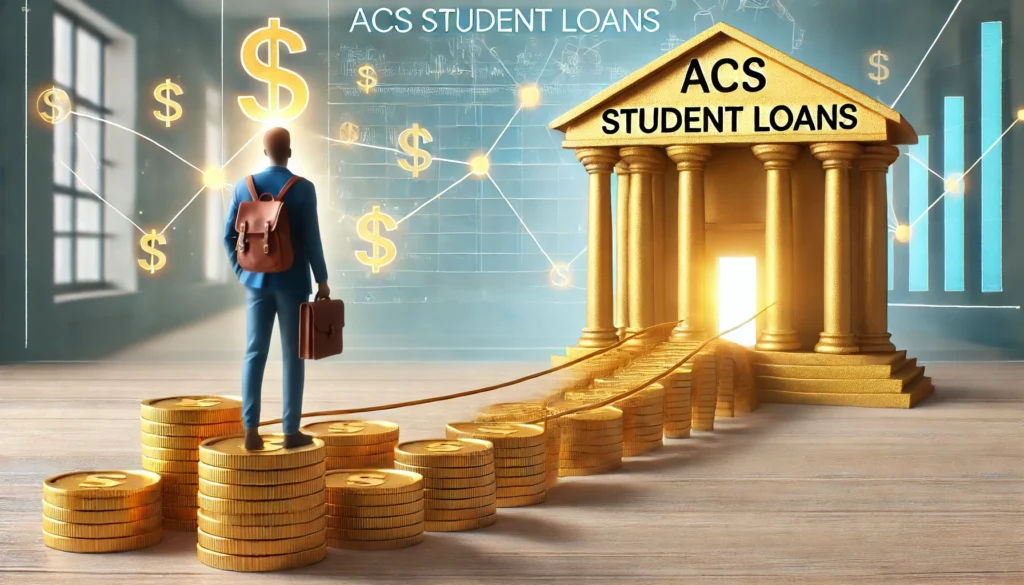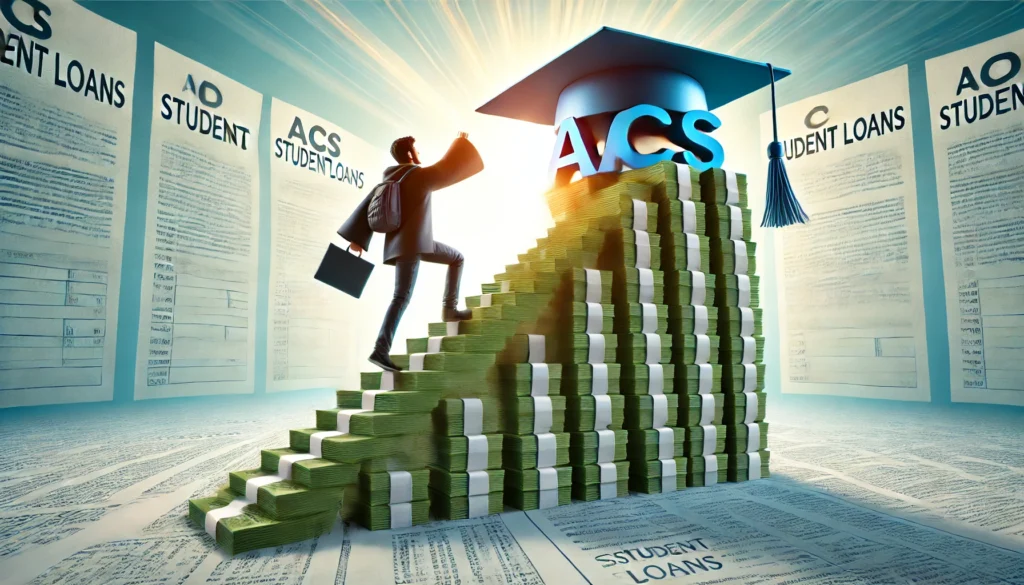Understanding ACS Student Loans and Their History
ACS student loans were once a major part of the student loan servicing landscape. Affiliated Computer Services, Inc. (ACS) was a loan servicer responsible for managing various federal and private student loans before it transitioned its loan servicing operations to other companies. Many borrowers who previously had ACS Inc. student loans may now have their loans serviced by different entities. However, understanding the history and operational structure of ACS loans can help borrowers navigate their repayment journey effectively.
You may also like: Federal Direct Consolidation Loan: A Smart Strategy to Simplify Student Debt
ACS was known for servicing a large volume of student loans, but over time, it faced numerous complaints regarding mismanagement, poor customer service, and inaccurate loan processing. These issues led to multiple lawsuits and a decline in ACS’s role in student loan servicing. Borrowers who originally had ACS student loans may now be working with loan servicers like Navient, Nelnet, or Aidvantage, depending on how their loans were reassigned.
Despite ACS no longer actively servicing student loans, borrowers may still deal with lingering issues related to payments, loan records, and previous account errors. Many who had ACS loans before the transition to other servicers found discrepancies in their repayment history or difficulty accessing accurate information. This underscores the importance of maintaining thorough records of student loan payments and being proactive in contacting the new loan servicer to ensure accuracy in repayment details.
For borrowers wondering whether their ACS loan terms have changed after the transition, it is essential to review their current repayment plans and confirm that all previous payments have been correctly applied. Since ACS student loans were transferred to multiple servicers, it is beneficial to contact the current servicer to clarify repayment terms, any available loan forgiveness programs, and options for consolidation or deferment.

Transition of ACS Inc. Student Loans to New Servicers
As ACS Inc. student loans were phased out, the loans under their management were distributed to different loan servicers. This transition meant that many borrowers had to adapt to a new servicing company, often requiring updated login credentials, payment processing changes, and different customer service protocols. The transition also raised concerns about whether past payment records were accurately reflected in the new loan servicer’s system.
One of the biggest challenges faced by borrowers during this transition was the inconsistency in loan information. Some borrowers reported changes in their interest rates, misapplied payments, or lost records after ACS transferred their loans. Because of this, it is crucial for borrowers to check their loan statements thoroughly to verify that all prior payments were accounted for properly. Contacting the new servicer to request a full account history can help ensure accuracy and avoid potential issues down the line.
Another aspect of the transition involved shifts in available repayment plans. While ACS student loans were previously eligible for a range of repayment options, new servicers may offer slightly different terms. Borrowers who were on income-driven repayment plans or pursuing Public Service Loan Forgiveness (PSLF) needed to confirm that their qualifying payments remained valid after the transfer. Any discrepancies in recorded payments could impact their eligibility for loan forgiveness programs.
For those who were making extra payments to reduce their loan principal, verifying how those payments were applied under the new servicer is also essential. Some borrowers discovered that payments previously designated toward reducing interest or principal balances were not handled correctly after their loans were transferred. To prevent such issues, borrowers should regularly review their loan statements and reach out to their servicers for clarification if needed.

Repayment Options for Borrowers with ACS Student Loans
Borrowers who had ACS student loans may now be eligible for a variety of repayment plans under their new loan servicer. These repayment options generally fall into standard, graduated, extended, or income-driven repayment plans. Choosing the right repayment strategy depends on financial goals, income level, and loan balance.
The standard repayment plan is the default option for most federal student loan borrowers and typically involves fixed monthly payments over a 10-year period. This plan allows borrowers to pay off their loans relatively quickly while minimizing interest accumulation. However, for those with high loan balances, the standard repayment plan may result in large monthly payments that can be financially burdensome.
Graduated repayment plans offer lower initial payments that gradually increase over time. This option benefits borrowers who anticipate rising income levels in the future. While this can make payments more manageable in the early years, it can also lead to higher interest costs over the life of the loan.
Extended repayment plans lengthen the repayment period to up to 25 years, reducing monthly payments but increasing overall interest costs. This plan is suitable for borrowers who need lower payments to accommodate other financial obligations, but it is not always the most cost-effective option in the long run.
Income-driven repayment plans adjust monthly payments based on a borrower’s income and family size. These plans include Income-Based Repayment (IBR), Pay As You Earn (PAYE), and Revised Pay As You Earn (REPAYE). Borrowers pursuing loan forgiveness programs, such as PSLF, often benefit from income-driven plans, as they allow for lower monthly payments while working toward the required qualifying payments for forgiveness.
For borrowers seeking a more structured approach, student loan consolidation can be a viable solution. Consolidating ACS loans into a Direct Consolidation Loan allows borrowers to simplify their repayment process by combining multiple loans into a single loan with a fixed interest rate. However, it is essential to assess the implications of consolidation, including potential changes to interest rates and repayment timelines.

Navigating Common Issues Associated with ACS Loans
Many borrowers who previously had ACS student loans encountered challenges related to payment processing, inaccurate billing, and communication difficulties. Even after transitioning to new servicers, some of these issues persisted, requiring borrowers to take proactive measures in managing their loans.
One of the most frequent issues reported was errors in payment allocation. Some borrowers found that extra payments they made toward their principal were instead applied toward future payments, preventing them from reducing their overall loan balance as intended. To avoid such issues, borrowers should specify how they want additional payments applied and verify that their loan servicer correctly processes these requests.
Another concern involved inaccurate reporting to credit bureaus. Late or missed payments that were incorrectly reported by ACS affected borrowers’ credit scores. Even after transferring to a new servicer, borrowers needed to ensure that their credit history accurately reflected their payment records. Disputing errors with both the loan servicer and the credit bureau was often necessary to correct such inaccuracies.
Customer service challenges were also a significant issue, with many borrowers struggling to receive clear and consistent information regarding their repayment options. Some borrowers reported difficulties reaching customer service representatives, receiving conflicting guidance, or facing delays in processing their requests. To mitigate these problems, borrowers should keep thorough records of all communications with their servicer and consider seeking assistance from a student loan advocate if needed.
Frequently Asked Questions (FAQ)
What happened to Affiliated Computer Services student loans?
Affiliated Computer Services student loans, commonly known as ACS student loans, were once managed by ACS Inc., which was a major student loan servicing company. Over time, many borrowers experienced issues with ACS loan servicing, including payment misallocations and poor customer service. Due to these widespread complaints, the Department of Education and private lenders transitioned loans previously managed by ACS to other servicers. If your loan was originally serviced by ACS Inc. student loans, it’s important to check with the Department of Education or your new servicer to confirm account details. Many borrowers have had to adjust to different repayment terms or servicing platforms following this transition.
How do I find out if I had an ACS student loan?
If you suspect you had an ACS student loan, the best way to confirm is by reviewing past loan statements or checking the National Student Loan Data System (NSLDS). Since Affiliated Computer Services student loans were transitioned to different servicers, your current loan account should provide information about your previous servicer. Many borrowers received notices about the change, but if you didn’t, contacting the Federal Student Aid office can help track your ACS loan history. Checking old bank records for payments made to ACS Inc. student loans may also provide clues about your past servicer. Staying informed about your loan history is crucial to managing your repayments effectively.
What issues did borrowers face with ACS Inc. student loans?
Borrowers with ACS Inc. student loans frequently reported problems such as lost payments, incorrect interest calculations, and difficulty accessing customer support. Affiliated Computer Services student loans gained a reputation for servicing errors, which led to lawsuits and federal scrutiny. Many borrowers struggled with misapplied payments, resulting in unnecessary late fees or increased loan balances. As a result, ACS student loans were eventually reassigned to other servicers who were expected to improve customer service and payment processing. However, some borrowers are still dealing with lingering issues from ACS’s management, making it essential to review past statements for accuracy.
Who services ACS student loans now?
ACS student loans were transferred to various federal and private loan servicers, depending on the type of loan and lender. If you had an ACS loan, it may now be managed by companies such as Nelnet, Navient, or Mohela. The Department of Education oversaw much of this transition to ensure borrowers received clearer guidance on repayment options. Borrowers should contact their current loan servicer to confirm account details and ensure their repayment plan is still aligned with their financial goals. If you’re unsure about your servicer, checking the Federal Student Aid website or reaching out to previous lenders can help clarify the situation.
Can I still consolidate my ACS loan?
Yes, you can still consolidate an ACS loan, provided it is a federal student loan eligible for a Direct Consolidation Loan. Borrowers looking to streamline payments or access better repayment plans should explore consolidation through the Department of Education. Private student loans previously serviced by ACS Inc. student loans may require refinancing instead of federal consolidation. Before consolidating, it’s important to compare interest rates and repayment terms to determine if it’s the right financial move. Consulting with a financial advisor or loan servicer can help ensure that consolidation benefits your long-term financial strategy.
Are there legal actions against ACS Inc. student loans?
Yes, Affiliated Computer Services student loans were the subject of legal actions due to improper loan servicing practices. Many borrowers filed complaints about misapplied payments, inaccurate reporting to credit agencies, and a lack of clear repayment guidance. These issues prompted regulatory scrutiny and lawsuits that ultimately led to the reassignment of ACS student loans to other servicers. If you believe you were negatively impacted by ACS loan mismanagement, reviewing legal settlement updates or contacting consumer protection agencies may provide recourse. Staying informed about borrower rights and servicer obligations is essential for protecting yourself from loan mismanagement.
How do I contact my new servicer if my ACS loan was transferred?
If your ACS student loan was transferred, you should receive a notice from your new loan servicer with updated contact information. You can also verify your current servicer through the Federal Student Aid website by logging into your account. If you’re unsure, calling the Department of Education’s student loan support center can provide clarity. It’s crucial to update your account details with the new servicer to avoid missed payments or miscommunication about repayment options. Ensuring that you have access to your new loan portal will help you manage your loan efficiently and stay on top of your repayment plan.
What repayment options are available for former ACS student loans?
Borrowers with former ACS student loans now have access to repayment plans based on the servicer managing their loan. If your loan is federal, you may qualify for income-driven repayment plans, deferment, or loan forgiveness programs. If your loan was private, the repayment terms depend on the lender that took over your ACS loan. Many borrowers opt for refinancing if their new servicer doesn’t offer favorable repayment options. Understanding your new servicer’s terms and exploring available repayment plans will help you manage your student debt more effectively.
Can I refinance my ACS loan with a different lender?
Yes, refinancing your ACS loan is an option, particularly if you have a private loan that doesn’t qualify for federal programs. Refinancing can potentially lower your interest rate or adjust repayment terms to better suit your financial situation. Many borrowers choose refinancing after their ACS student loans were transferred to servicers with less favorable terms. Before refinancing, comparing offers from multiple lenders will help ensure you secure the best possible interest rate and loan terms. Careful evaluation of repayment conditions will help you determine whether refinancing is the right move for your financial future.
What should I do if I still have issues from my ACS loan?
If you’re experiencing ongoing issues related to an ACS loan, the first step is to contact your current loan servicer for clarification and resolution. If the issue stems from past ACS Inc. student loans mismanagement, you may need to review historical account records and dispute inaccuracies. Filing a complaint with the Consumer Financial Protection Bureau (CFPB) or the Department of Education may also provide recourse. Some borrowers have successfully corrected errors through persistence and by seeking legal advice when necessary. Ensuring that your loan details are accurate and advocating for your rights can prevent long-term financial consequences.
Conclusion
Although ACS student loans are no longer actively serviced by Affiliated Computer Services, Inc., many borrowers still face challenges related to past mismanagement, transition issues, and ongoing repayment concerns. Understanding how these loans were transferred to new servicers, verifying payment histories, and exploring available repayment options are crucial steps for borrowers seeking to manage their student debt effectively.
For those still encountering issues related to ACS loans, staying proactive in monitoring loan statements, maintaining open communication with their new servicer, and leveraging available repayment assistance programs can help navigate the complexities of student loan repayment. Whether considering consolidation, income-driven repayment, or pursuing loan forgiveness, borrowers should take a strategic approach to ensure their student loans are managed efficiently and in alignment with their financial goals.
student loan repayment, student loan servicer transition, loan management, federal student loans, repayment plans, income-driven repayment, loan forgiveness, credit score impact, debt management, student debt relief, loan consolidation, public service loan forgiveness, financial literacy, borrower rights, financial planning, education loans, interest rates, credit impact of student loans, ACS loan servicing, student loan advocacy
Further Reading:
Ranked: The Best Federal Student Loan Servicers Today
Federal Student Loan Servicers: Who They Are and What They Do
Federal Student Loan Servicers: Who They Are and What They Do
The information provided in this article is for general informational purposes only and is not intended to constitute financial, investment, legal, tax, or other professional advice. The content should not be relied upon for making any financial or investment decisions. Readers are encouraged to consult with licensed professionals, such as financial advisors, attorneys, or tax experts, to obtain personalized advice tailored to their individual circumstances. The author and publisher disclaim any liability for any actions taken or not taken based on the information provided in this article.





